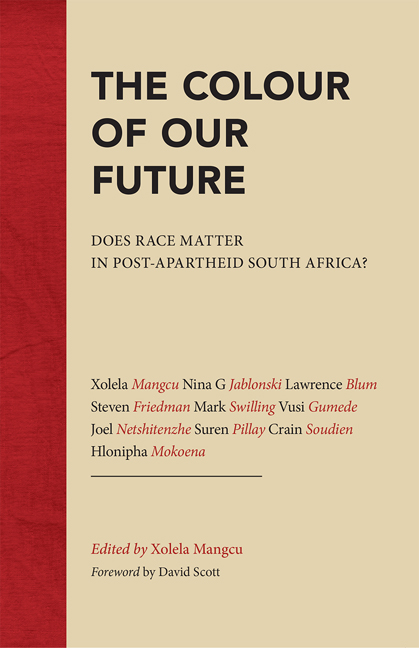Book contents
- Frontmatter
- Dedication
- Contents
- Figures and tables
- Acronyms and abbreviations
- Foreword
- Preface
- Chapter One What Moving Beyond Race Can Actually Mean: Towards a Joint Culture
- Chapter Two The Colour of Our Past and Present: The Evolution of Human Skin Pigmentation
- Chapter Three Races, Racialised Groups and Racial Identity: Perspectives from South Africa and the United States
- Chapter Four The Janus Face of the Past: Preserving and Resisting South African Path Dependence
- Chapter Five How Black is the Future of Green in South Africa's Urban Future?
- Chapter Six Inequality in Democratic South Africa
- Chapter Seven Interrogating the Concept and Dynamics of Race in Public Policy
- Chapter Eight Why I Am No Longer a Non-Racialist: Identity and Difference
- Chapter Nine Interrogating Transformation in South African Higher Education
- Chapter Ten The Black Interpreters and the Arch of History
- Notes
- Contributors
- Index
Preface
Published online by Cambridge University Press: 20 April 2018
- Frontmatter
- Dedication
- Contents
- Figures and tables
- Acronyms and abbreviations
- Foreword
- Preface
- Chapter One What Moving Beyond Race Can Actually Mean: Towards a Joint Culture
- Chapter Two The Colour of Our Past and Present: The Evolution of Human Skin Pigmentation
- Chapter Three Races, Racialised Groups and Racial Identity: Perspectives from South Africa and the United States
- Chapter Four The Janus Face of the Past: Preserving and Resisting South African Path Dependence
- Chapter Five How Black is the Future of Green in South Africa's Urban Future?
- Chapter Six Inequality in Democratic South Africa
- Chapter Seven Interrogating the Concept and Dynamics of Race in Public Policy
- Chapter Eight Why I Am No Longer a Non-Racialist: Identity and Difference
- Chapter Nine Interrogating Transformation in South African Higher Education
- Chapter Ten The Black Interpreters and the Arch of History
- Notes
- Contributors
- Index
Summary
No single concept has shaped the modern world quite like ‘race’ or, more directly, colonial racism. Francisco López de Gómara described Columbus's ‘discovery’ of the Americas as ‘the greatest event since the creation of the world (excluding the incarnation of and death of Him who created it)’. Joseph Leo Koerner described Pedro Álvares Cabral's ‘discovery’ of the Tupinambá off the coast of Brazil a decade later as an ‘epochal event’. According to Biodun Jeyifo, colonialism was ‘perhaps the single most important historical force in the making and unmaking of the modern world’, while Ira Katznelson notes that ‘the conquest, expulsion, and enslavement engendered by colonialism made of all the world a community of Jews’. The distinguished historian Eric Hobsbawm has dubbed the last four hundred years as the era of ‘Euromegalomania’.
Europe's expansion into the New World was carried out initially by the Portuguese and the Spanish, but this role soon passed to what Georges Lefebvre described as ‘England, the mistress of the seas … the only nation capable of imposing the authority of the white man’. However, as British – and French, Belgian and German – dominion over the colonies loosened, a new age was set upon the world. Henry Luce charitably called it the American Century, and Cornel West critically christened it as the Age of American Empire.
What do these brief accounts of colonial racism and empire have to do with a discussion of race in South Africa? To maintain order at home, colonial powers exported their lower classes to the new-found colonies, where they would be masters of their own realms. Or as Benedict Anderson puts it, ‘colonial racism was a major element in that conception of Empire which attempted to wield dynastic legitimacy and national community. It did so by generating a principle of innate inherited superiority … conveying the idea that if, say, English lords were superior to other Englishmen, no matter: these other Englishmen were no less superior to the subjected natives.’ Koerner argues the same point when he notes that ‘difference within an entity [thus] was repressed in favor of difference between entities.’
- Type
- Chapter
- Information
- The Colour of Our FutureDoes race matter in post-apartheid South Africa?, pp. xiii - xxiiPublisher: Wits University PressPrint publication year: 2015



